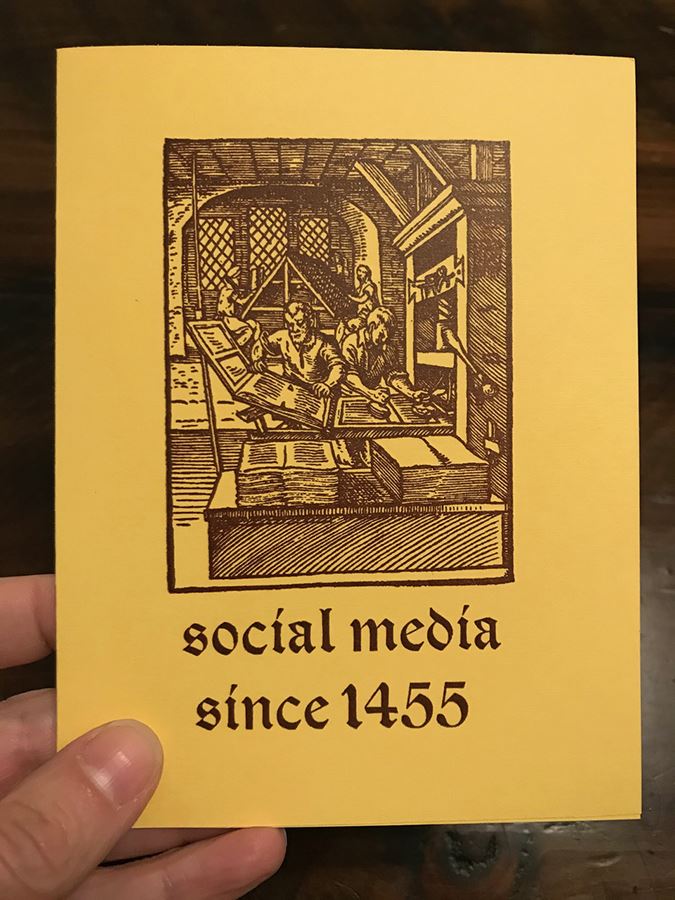First, a confession.
In my last post I referred to the castillo/corrales Paraguay Press series The Social Life of the Book (SLOB) with having only once glimpsing an issue belonging to a friend, while staying in her apartment, across the country from mine. Years ago.
After my last post I ordered the complete set of eight issues from the After 8 Books (Paris) online shop. The package just arrived. To my surprise, there is very little on what I had imagined as the social life of the book. The exception is James Hoff’s essay about, among other things, the role of personal anecdotes and “a social working process” in making books. Otherwise, the series description printed on the back of each issue accurately characterizes it as “original texts by writers, artists, publishers, designers, booksellers, etc. – reflecting on reading, designing, publishing, and distributing books, today.” By its very existence the series creates a social life of the book in the form of a conversation from one issue to the next, and each issue and its reader, and certainly the editorial process that led to the creation of the series in the first place. I very much enjoyed it, but it was not what I was expecting.
So what was I expecting?
What did I imagine would constitute “the social life of the book?”
- The scenario described in the first paragraph above. The book learned about, accidentally, from a friend. The book as part of sociability.
- The loaned book.
- The borrowed book.
- The recommended book.
- The book as gift: to give or receive a book.
- Reading aloud, one person to another; one person to a group. Multiple people reading aloud, as a group.
- The book group: reading the same book together, discussing it.
- The growth in social awareness that comes from reading novels that explore character interiority.
- The assigned book / the textbook / the reader, read and discussed in common for a specific purpose.
- The reserved book / the desk copy.
- The life of a library book, one volume circulating within a place-based community.
- The book as hub, as agreement, as rule book, willingly entered into as contract: the Cub Scout Handbook, the Dungeon Master’s Guide.
- The book as agreement not completely freely chosen: an employee handbook, a directory of “must/should” and “do not.”
- A violated diary: the reading of a private book.
- The book read at night that keeps your partner awake because you are reading it: the begrudged book.
- The book as signifier: representing something other than itself, a way of a tribe recognizing its members.
- The book launch, the book signing: social events around the book.
- The book fair, the art book fair in particular, often organized by other independent artists and art publishers for other artists and art publishers, rather than by institutions or organizations. The New England Art Book Fair (Portland, ME) and the Northampton Print & Book Fair (MA) are both this way, organized by artists and held at artist-run spaces operated by artists other than the fair organizers.
- Book trades at art book fairs: perpetuating the relationship beyond the fair, as the received book serves as a stand-in for the person who made it.
- The postal trading networks of zine culture: reciprocal exchange, circulating books instead of money, creating relationships instead of transactions.
- Collating parties, binding parties, socially producing books together in one place.
- All those book-generated friendships that come from being around other book people.
I see I was imagining the social life of the book to be the bonds, engagements, relationships created between people, because of books. And clearly this list is only a beginning, an incomplete inventory of the social life of the book. Reader, what would you add to it? Please comment! The blog is free to be actively social in a different way than the book.

A letterpress printed card by the Virginia Center for the Book, Charlottesville, where I wrote this post. My visit was thanks to Professor Dean Dass, University of Virginia: another enactment of the social life of the book. Thank you, Dean.
Emily Larned has been publishing since 1993, when as a teenager she made her first zine. She is co-founder of Impractical Labor in Service of the Speculative Arts (ILSSA), a union for reflective creative practice, and founder of Alder & Frankia, an imprint of collaborations and feminist anthologies and reissues. She is currently Assistant Professor of Graphic Design at the University of Connecticut, Storrs.

